- Home
- James S. A. Corey
Cibola Burn (Expanse) Page 7
Cibola Burn (Expanse) Read online
Page 7
“Tell me about it. If I’d known how it would all play out, I’d have spent my rotations in the general clinics.”
“Well, you’re the best hand surgeon on the planet.”
“The best hand surgeon on the planet is doing a lot of reading on digestive disorders and gynecological exams,” Lucia said dryly. Her eyes went hard, distant. “We need to talk about Felcia.”
And here it was. The gentleness, the calm, the soft memories. This was where it had been leading. He sat forward, his eyes cast on the ground.
“What’s to say?”
“She’s been talking about what happens next. For her.”
“Same as happens for any of us,” Basia said.
Lucia put another bite in her mouth, chewing slowly, though the food hardly required it. A gust of hard wind pressed in at the window with the soft ticking of grit against the glass. When she spoke, her voice was soft, but implacable.
“She’s thinking of university,” Lucia said. “She’s done the tutorials and examinations on the network. She needs us to give permission before the applications move forward.”
“She’s too young,” Basia said, knowing as the words came out that it was the wrong tack. Frustration knotted his throat and he put his dinner, half eaten, on the armrest.
“She won’t be by the time she gets there,” Lucia said. “If she went with the first shipment and transferred at Medina, she could be on Ganymede or Ceres Station in nineteen months. Twenty.”
“We need her here,” Basia said, his tone hard and definitive. The conversation was over. Except that it wasn’t.
“I don’t regret coming here,” Lucia said. “And you didn’t force me to come. The months after Ganymede when we were all living like rats packed too tight? All the ports that wouldn’t take us in? I remember that. When Mao-Kwikowski was dissolved, I was the one who helped Captain Andrada draw up the salvage papers. I made the Barbapiccola our ship.”
“I know.”
“When we took the vote, my voice was with yours. Maybe living so long as refugees made us wild or brave. I don’t know, but to come here. To begin everything again under a sky. Under some new star. I thought it was as obvious as you did, and I don’t regret coming.”
Her tone was fierce now. Her dark eyes glittered and flashed, daring him to disagree. He didn’t.
“If we spend the rest of our lives mining lithium and trying to grow carrots, I will be delighted with that,” she went on. “If I never reattach another ligament or regrow a lost thumb, then fine. Because I chose it. Jacek and Felcia didn’t make that choice.”
“I’m not sending my children back,” Basia said. “What would they get back there? With all the work that needs to be done here, with all the things there are to be learned and discovered here, how is going backward a good idea?” His voice was getting louder than he’d meant, but he wasn’t shouting. Not really.
“Being here is our choice,” Lucia said. “Felica’s choice is where her choice is. We can stand in the way or we can help.”
“Helping her back into that isn’t helping,” Basia said. “She belongs here. We all belong here.”
“Where we came from —”
“We came from here. Nothing that happened before matters. We are from here now. Ilus. I will go down dying before I let them bring their wars and their weapons and their corporations and their science projects here. And I will be damned if they get any more of my children.”
“Dad?”
Jacek stood in the doorway. He had a soccer ball on his hip and an expression of concern in his eyes.
“Son,” Basia said.
The moaning of the wind was the only sound. Basia stood up, took his canister and then Lucia’s. Taking her leavings to the recycler was a small olive branch, but it was all he had. The sense of impotent rage and shame boiled up in his throat and found to release there. Katoa, the landing pad, the concern in Jacek’s eyes. The years they had spent fleeing only to land in a brick palace that his daughter wanted to leave. All of it mixed into a single emasculating anger as hot as solder.
“Is everything okay?” Jacek asked.
“Your mother and I were just talking.”
“We aren’t from here,” Lucia said as if Jacek hadn’t come in, as if the adult conversation could go on with the boy there. “We’re making it that way, but it isn’t true yet.”
“It will be,” Basia said.
Chapter Six: Elvi
E
lvi sat in the high meadow, her legs stretched out before her, and watched quietly. The plant analogs – she couldn’t really call them plants – lifted up above the dry, beige soil, straining toward the sunlight. The tallest stood hardly more than half a meter with a flat corrugated top that shifted to follow the sun and glittered the iridescent green of a beetle’s carapace. A gentle breeze shifted the stalks and cooled Elvi’s cheek. She didn’t move. Four meters away, a mimic lizard cooed.
This time, the answering coo was closer. Elvi fought not to bounce with excitement. She wanted to wave her hands in glee, wanted to giggle. She stayed still as a stone. The prey species waddled closer. About the size of a sparrow, it had a soft rill of something like feathers or thick hair that ran down its sides. It had six long, ungainly legs, each ending in a doubled hook. She wanted to see them as fingers or toes, but she hadn’t seen any of the little things use the hooks to manipulate anything. It cooed again, a soft guttural chuffing halfway between a dove’s call and a tambourine. The mimic lizard waited a moment, its wide-set eyes shifting toward the little animal. Elvi watched for the tremor in the lizard’s side, an almost invisible fluttering of its scalelike skin.
With the speed of a gun, the lizard’s mouth unhinged and a mass of wet pink flesh shot out. The prey animal didn’t so much as squeak as the lizard’s inverted stomach drove it to the ground. Elvi’s fists wriggled in delight as the mimic lizard began hauling its internal organs back across the dry ground. The prey species was dead or paralyzed, adhering to the pink flesh. Dirt and small stones stuck to the stomach too. Eventually the whole mass reached the mimic lizard’s too-wide jaw, and it began the long process of drawing the messy complex back through its mouth. From her previous observations, Elvi knew it would take the better part of an hour before the mimic lizard’s newly concave sides filled out again. She stood up, dusting herself off, and hobbled over.
Her foot was still in the cast she’d gotten on that terrible first night. The pain from the broken bone was only a dull ache now, more an annoyance than a problem, but the cast made mobility an issue. She opened her satchel, the black lattice fabric ticking under her fingers, then gently lifted the feeding lizard into it. Its gaze flickered across her, untrusting. That was fair.
“Sorry, little one,” she said. “It’s in the name of science.”
She closed the satchel and triggered the collection sequence. The lizard died instantly, and the internal assay sequence began, cataloging the gross structures of the animal’s body, firing hair-thin needles through the corpse to gather samples at every boundary between tissues and feeding the data up to the dedicated system in the satchel’s strap. By the time she got back to her little hut and took the corpses out for storage and cataloging, the mimic lizard and its prey would be modeled in her computer, terabytes of information ready to stream up to the Edward Israel and from there back to the labs on Luna. It would take the signal a few hours to travel the distance that had taken her eighteen months, but for those hours, she and her workgroup would be the only people in all the billions of humans scattered throughout the planets who would know this little being’s secrets. If God had come and offered her the Library of Alexandria in exchange, she wouldn’t have taken the trade.
As she tramped down the gentle slope toward her hut, the mining village spread out before her. It was tiny. Two parallel streets with a gap in the middle that passed for a town square. The buildings were cobbled together from the supplies they’d brought and what they could find on the planetary surface. Everyth
ing stood at slightly wrong angles, like a handful of dice had been scattered there. She was used to the strict rectilinear architecture that came from living where space was precious. That didn’t apply here, and it made the little town seem more organic, like it had simply grown there.
Fayez was sitting on the small porch outside her hut. His skin had darkened in the weeks since the crash. The preliminary hydrological study had kept him and several of the others from the team out in the field for almost two weeks.
“You know what I love about this planet?” Fayez said instead of hello.
“Nothing?”
He scowled at her, feigning hurt feelings. “I love the period of rotation. Thirty hours. You can get in a full day’s work, stay up getting drunk at the saloon, and still get a full night’s sleep. I don’t know why we didn’t think of this back home.”
“There are advantages,” Elvi said, unlocking her door and stepping into the hut.
“Of course it means we’ve been here almost six weeks in the past month,” Fayez said, “but thank God we didn’t get one of those little spinning tops with sundown every six hours. Now if they can just fix the gravity.”
The unit was a single four-by-six-meter room with bed, shower, toilet, kitchen, and workstation all hunched together. As she put the satchel into the archiving unit, it struck her how much her work was about inferring things from design. As soon as she’d seen the mimic lizard’s forward-facing eyes, she’d assumed it was a predator. Anyone looking at her hut would know it had been made with the assumption that space would be at a premium. Everything was an artifact of its function. That was what made evolution so gorgeous. She looked in the mirror over her little sink. Her skin was covered in a thin layer of beige dust, like stage makeup.
“I don’t want to do this,” she said, wiping her cheeks with a damp tissue.
“Look on the bright side,” Fayez said. “They’ve only tried to kill us once so far.”
“You aren’t helping.”
“I’m not trying,” he said, then winced at the unintentional reference to the dead man.
They had cremated Governor Trying and the other casualties of the crash. Apart from one villager who’d arrived with non-responsive bone cancer, they had been the first human deaths on the world. Certainly they were the first murders.
But after that, the people from the village had been nothing but kind. Lucia Merton, the doctor who’d come to help them after the crash, had followed up with each of the survivors. A Belter from Ceres named Jordan had brought Elvi food that his wife had cooked for the injured. The holy man had invited her to the services at the village temple. Everything about the inhabitants of New Terra said that they were kind, gentle, authentic people. Except that someone had killed the governor and almost a dozen others.
The RCE encampment stood south of the village proper.
With Elvi and Fayez included, a little less than half the RCE employees on the surface had chosen to attend the village’s community meeting. The others were involved in their work or still too badly injured. If she hadn’t felt it was part of her job to educate everyone about the contamination hazards, Elvi would probably have stayed back at her hut too.
Most of the RCE personnel were field scientists. They dressed for comfort, herself included. The only ones in formal clothes were the security team. Hobart Reeve, Murtry’s second, led three armed guards in RCE uniforms that made them look like soldiers or police. They hadn’t been on the big shuttle, but had arrived on a light shuttle almost immediately. When the order had come in from RCE that no new personnel were going planetside until the UN observer arrived, Reeve had already been investigating what he always called “the incident.”
The community hall was one side of the village’s central square, set across the bare dirt and stone from the temple. Apart from the collection of religious iconography at the temple’s eaves, the two were hard to tell apart.
The chairs were made from industrial cowling and modified crash couches. If the village had been in a more temperate part of the planet, there would have been more local flora, some sort of wood analog, to use. But this was where the lithium was nearest the surface, and lithium was what would bring money to the community. So like a microorganism moving along a concentration gradient, all of humanity had come to these twenty square kilometers.
Elvi sat at the back with the other RCE employees, except Reeve and the security detail, who sat closer to the front with the locals. She watched them all segregate without a word. No one enforced the separation, but it was there. Michaela, an atmospheric physicist, sat beside her with a smile. Anneke and Tor, both geoengineers, sat on her other side, hand in hand. Fayez in the couch beyond her, talking with Sudyam, who had come down with the first small shuttle after the accident. The incident. The attack. Anneke leaned in and murmured something to Tor. He blushed and nodded a little too vigorously. Elvi tried to ignore the sexual byplay.
The mayor of First Landing was a thick-featured Martian woman with a broad accent and finger-cut hair named Carol Chiwewe, only they called her the coordinator, not the mayor. She called the meeting to order, and Elvi felt her heart starting to beat faster. The Belters had set the agenda, and so it started off with issues that were more important to them than to Elvi or RCE: the maintenance schedule for the water purification systems, whether to accept a credit line from an OPA-backed bank at unfavorable terms or wait until the first load of lithium came back and try for better. Everything was talked about in calm, considered terms. If there was anger or fear or murder, they had buried it so deeply that the mound didn’t show.
Reeve’s turn came, and he stepped smartly to the front of the room. His lips made a thin, forced smile.
“Thank you, madam coordinator, for inviting us to speak,” he said. “We have confirmation that the independent observer is on the way with a commission from the UN, the Martian congress, and the OPA to assist with moving the development of the colony forward. It is our hope to have the security issues addressed before they arrive.”
We hope to hang the bad guys on a rope before anyone gets here and says we can’t, Fayez translated quietly enough for the words to reach Elvi’s ears and no farther.
“We have definitively identified the explosive used in the attack, and we are looking into which individuals had access to it.”
We don’t have a goddamn clue who did it, and since you hicks store mining explosives in an unlocked shed, we aren’t going to figure it out anytime soon.
“I don’t have to explain the gravity of this situation, but Royal Charter Energy is committed to the success of this colony for both our employees and this community. We’re all in this together, and my door is always open to anyone with questions or concerns, and I hope that we can rely on the same kindness and collaboration that you’ve extended to us since we came.”
So since we’ve got nothing, we’d really appreciate it if those of you who know who set the charges would just tell us. And also please consider not murdering us in our sleep. Thanks for that.
Sudyam coughed to hide her laughter and Fayez flashed a grin. At the front of the room, Reeve nodded and stepped down. The coordinator stood up, looking toward the back of the room. Elvi felt the sudden, powerful need to urinate.
“Doctor Okoye?” the coordinator said. “You wanted to speak?”
Elvi nodded and rose to her feet. It was about ten meters to the front of the room, and Elvi walked forward with her nerves screaming. The heat of the crowd’s bodies seemed suddenly oppressive, the smell of sweat and dust overwhelming. Her tongue felt sticky and thick in her mouth, but she smiled. At an estimate, two hundred people sat before her, their eyes on her. Her heart ticked over so fast she had to wonder whether there was enough air in the room. She remembered someone telling her once to look for a friendly face in the crowd and pretend she was only speaking to them. Four rows in on the left, Lucia Merton was sitting with her hands folded in her lap. Elvi smiled, and the woman smiled back.
“I jus
t wanted to take a minute,” Elvi said, “to talk about how we can limit cross-contamination with the environment? Because we lost the dome? The hard perimeter dome?”
Lucia looked grave. Elvi chanced a look at the rest of the crowd and then wished she hadn’t.
“Part… um. Part of the RCE’s agreement with the UN was that we do a complete environmental study. We’re in just the second biosphere that we’ve ever seen, and there’s so much we don’t know about it that the more we can keep it pristine, the better we’ll be able to understand it. Ideally, we’d have a totally enclosed system here on the surface. Tight as a ship. Airlocks and decontamination rooms and…”
She was babbling. She grinned, hoping that someone would smile back. No one did. She swallowed.
“Every time we breathe, we’re taking in totally unknown microorganisms. And even though we’ve got different proteomes, we’re still big blobs of water and minerals. Sooner or later one of the indigenous species is going to find a way to exploit that. And it goes the other way too. Every time we defecate, we’re introducing billions of bacteria into the environment.”

 Leviathan Wakes
Leviathan Wakes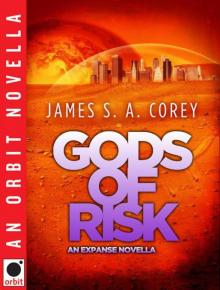 Gods of Risk
Gods of Risk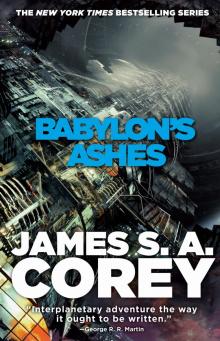 Babylon's Ashes
Babylon's Ashes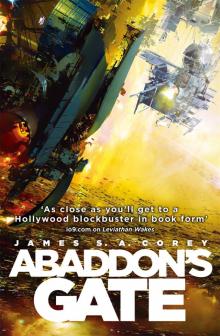 Expanse 03 - Abaddon’s Gate
Expanse 03 - Abaddon’s Gate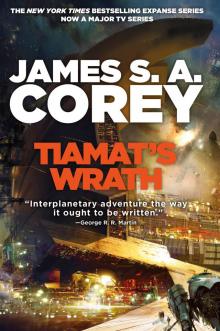 Tiamat's Wrath
Tiamat's Wrath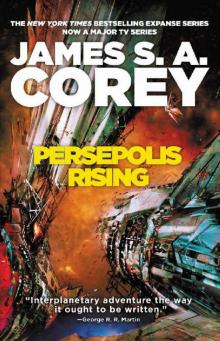 Persepolis Rising
Persepolis Rising The Butcher of Anderson Station
The Butcher of Anderson Station The Churn
The Churn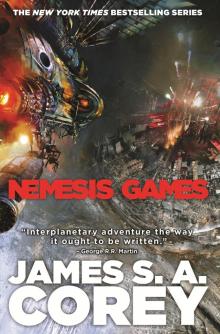 Expanse 05 - Nemesis Games
Expanse 05 - Nemesis Games Strange Dogs
Strange Dogs Honor Among Thieves: Star Wars
Honor Among Thieves: Star Wars Cibola Burn
Cibola Burn Caliban's War
Caliban's War The Vital Abyss
The Vital Abyss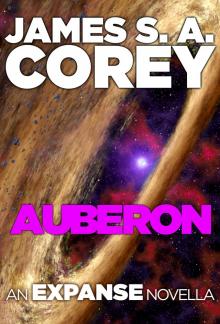 Auberon
Auberon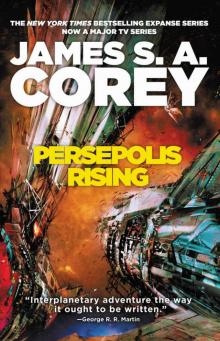 Persepolis Rising (The Expanse)
Persepolis Rising (The Expanse) Caliban's War: Book Two of the Expanse series
Caliban's War: Book Two of the Expanse series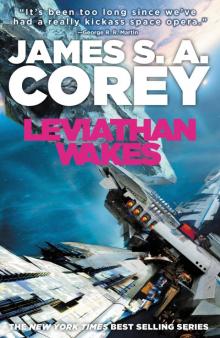 Leviathan Wakes: Book One of The Expanse
Leviathan Wakes: Book One of The Expanse Cibola Burn (Expanse)
Cibola Burn (Expanse) Strange Dogs (Expanse)
Strange Dogs (Expanse) The Vital Abyss: An Expanse Novella (The Expanse)
The Vital Abyss: An Expanse Novella (The Expanse) Leviathan Wakes e-1
Leviathan Wakes e-1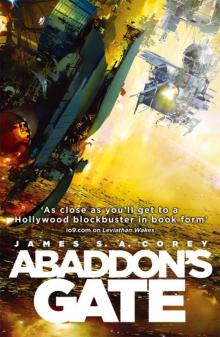 Abaddon's Gate e-3
Abaddon's Gate e-3 Caliban;s war e-2
Caliban;s war e-2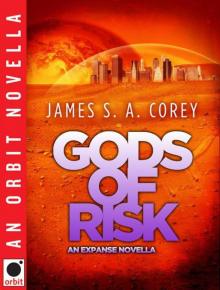 Gods of Risk: An Expanse Novella
Gods of Risk: An Expanse Novella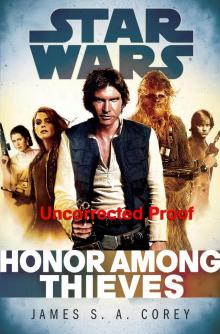 Honor Among Thieves: Star Wars (Empire and Rebellion)
Honor Among Thieves: Star Wars (Empire and Rebellion)